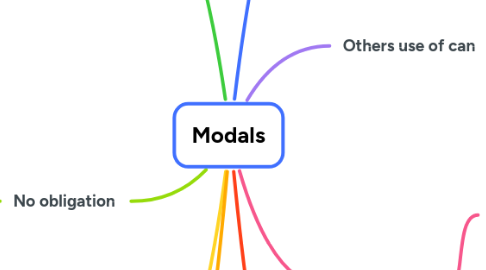
1. Obligation and necessity
1.1. We use have to or need to when there is an institutional rule or a law
1.1.1. Ex: You have to get a work permit before you go
1.2. The verbs must, have to, have got to and need to express obligation and necessity
1.2.1. Ex: You mustn't dress too casually for work
1.3. Must is usually used on signs, notices and printed information
1.3.1. Ex: All employees must hold a valid work permit
1.4. We use must when the obligation comes from the speaker
1.4.1. Ex: You must invite me to visit you
1.5. We can use have to or need to to talk about obligation and necessity with past and future tenses
1.5.1. Ex: He had to get up really early to catch the bus to work
2. No obligation
2.1. We use not have to, not need to and needn't to suggest that there is no obligation or necessity to do something
2.1.1. Ex: You needn't buy lots of guide books before you go
2.2. Mustn't does not mean the same as don't have to, don't need to or needn't
2.2.1. Ex: You don't have to wait for ages. (it is not necessary to wait) You mustn't wait here. (it is not allowed to wait here)
2.3. To talk about lack of obligation in the past we can use needn't have+past participle, didn't need to or didn't have to.
2.3.1. Ex: We didn't have to worry about work permits when i was there
3. Suggestions and advice
3.1. We can use modal verb should(n't) and ought(not) to to make suggestions or give advice
3.1.1. Ex: You should eat an apple a day
3.2. We can use must to give strong advice.
3.2.1. Ex: You must phone me when you get there
4. Adverbs
4.1. Advesbs like "also, always, never, sometimes, just, only" come after modal verbs
4.1.1. Ex: You must never do that again
5. Ability
5.1. Present: can, can't, be able to, manage to.
5.1.1. Ex: I can't swim.
5.2. Past: could, couldn't, be able to, manage to.
5.2.1. Ex:They weren't able to find out his name.
5.3. Perfect: be able to, manage to.
5.3.1. Ex: Have you managed to finish the report yet?
5.4. Future: be able to, manage to.
5.4.1. Ex: I won't be able to meet you later
6. Others use of can
6.1. We use "can" to mean sometimes.
6.1.1. Ex: People can do funny things when they've experienced something terrible
6.2. We also use "can" to ask for and give permission.
6.2.1. Ex: Can I borrow this book?
7. Possibility
7.1. Present tense
7.1.1. We use may, might, could, must, can (+not)+ V to talk about possibility in the present
7.1.1.1. Ex: He may remember somethings already
7.1.2. We use may, might, could, must, can (+not)+be+ V-ing to talk about things possibly happening or in the progress at the time speaking
7.1.2.1. Ex: The phone is engaged. She might be talking to her sister on the phone
7.2. Past tense
7.2.1. We use may, might, could, must, can (+not)+have been+ V-ing to talk about things possibly happening or in the progress in the past
7.2.1.1. Ex: He might have been trying to run away from his past
7.2.2. We use may, might, could, must, can (+not)+have+past participle to talk about possibility in the past
7.2.2.1. Ex: He could have had a wife and children
8. Alternatives to modals
8.1. Adverbs like certainly, probadly, possibly, perhaps and maybe can be used to express similar ideas to modal verbs
8.1.1. Ex: He had probadly been attacked and robbed
8.2. We can it+be+certain/likely/ probable/possible/impossible to express ability, probability and possibility
8.2.1. Ex: It is possible that the train will be late
